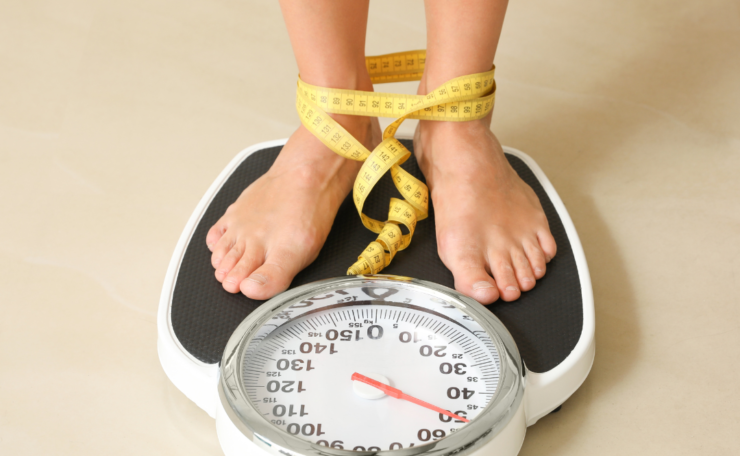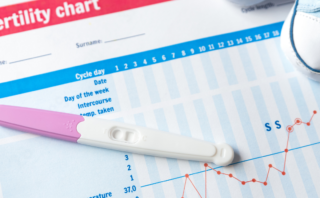What You Can Do!
Let’s shift gears and explore your weight and how it can impact your reproductive health. We are not talking about body image or hitting a certain number on the scale. This is about how your body functions best – especially when talking about hormone balance and ovulation.
Often weight is measured using Body Mass Index which calculates where you fall based on your height and weight. It’s not a perfect tool. It does offer general insight. A “balanced” BMI typically falls between 18.5 and 24.9.
Being either underweight or overweight can have substantial effects on your reproductive health:
Underweight: If you are underweight it can cause your body to not ovulate or have irregular cycles because your body will lack the necessary nutrients for hormone production and regular menstruation.
Overweight/Obese: On the other hand, being overweight or obese can lead to imbalances in reproductive hormones which can disrupt ovulation. Excess weight can also lead to insulin resistance which can affect ovulation and egg quality.
Why This Matters for Your Fertility – and What You Can Do
Your weight is not just a number, it can have a powerful effect on your reproductive health. Whether you fall below or above the optimal range, your body may struggle to ovulate regularly, balance hormones, or create the ideal environment for conception.
You don’t have to guess what to do next. Below is step-by-step fertility friendly guidance tailored to your unique needs if you are underweight or carrying extra weight. Small and intentional shifts can create big changes in your body’s ability to support a healthy pregnancy.
If You Are Overweight or Obese
Carrying extra weight can lead to hormonal imbalances that affect ovulation and cycle regularity. Higher levels of body fat can increase estrogen production which may interfere with your body’s natural hormone rhythms. This can make it more difficult to conceive and may also impact egg quality.
Extra weight, especially around the midsection, can lead to insulin resistance, which has been linked to PCOS and other fertility challenges. Insulin resistance can interfere with ovulation, increase inflammation and affect the quality of your eggs and the uterine environment.
The goal isn’t perfection – it’s balance.
Hitting a perfect number isn’t necessary. Research shows that even a 5-10% reduction in body weight can improve ovulation, hormone levels and chances of conception. Here are some fertility-supportive ways to improve your BMI while being kind to your body:
- Focus on Whole, Nourishing Foods: Aim for a diet full of: Colorful veggies (leafy greens, cruciferous veggies like broccoli and cauliflower); high fiber fruits (berries, apples pears); lean proteins (beans, lentils, pasture-raised poultry, eggs or plant-based options); healthy fats (avocados, olive oil, nuts, seeds); whole grains (quinoa, oats, brown rice). Avoid overly restrictive dieting, which can backfire by increasing stress and messing with hormone balance. Think slow and steady nourishment instead of quick fixes.
- Track Progress with Awareness, Not Obsession: Use apps like Cronometer or MyFitnessPal to track your meals, nutrient intake, and energy balance if that feels empowering. Cronometer is especially useful for making sure you are getting fertility-critical nutrients like folate, magnesium, zinc, iron and vitamin D. Remember, tracking is a tool not a rule. Use it to learn about your body and not to judge it.
- Move Your Body Consistently (But Kindly): Exercise improves insulin sensitivity, supports metabolism, and reduces inflammation – all of which are powerful for fertility. The best workouts are the ones you will actually enjoy and stick with such as: brisk walking (especially after meals); strength training (great for hormone balance); low-impact cardio like cycling or swimming; dance, yoga or fun movement classes; even 20 – 30 minutes per day can make a difference.
- Manage Stress: Chronic stress raises cortisol, which competes with sex hormones and can worsen insulin resistance. Try: deep breathing or meditation; gentle yoga or restorative stretching; time in nature or grounding practices; journaling or creative expression; making stress reduction a priority isn’t a luxury – it is part of the fertility equation
- Prioritize Sleep: Poor sleep is linked to weight gain, insulin resistance and hormone disruption. Aim for 7 – 9 hours of high-quality sleep per night and stick to a consistent sleep schedule when possible.
- Stay Hydrated: Drinking enough water supports metabolism, hormone transport and detoxification – all essential for fertility. A good starting point is about half your body weight in ounces of water per day.
- Rule Out Underlying Conditions: Sometimes excess weight is connected to hidden imbalances like thyroid dysfunction, PCOS or chronic inflammation. If you are struggling to lose weight despite your best efforts, it’s worth working with a functional or fertility focused practitioner who can run deeper tests and tailor a plan just for you.
If You Are Underweight
Being underweight can disrupt your menstrual cycle – or even stop it altogether. That’s because your body needs enough fuel (calories, healthy fats and key nutrients) to produce the hormones that regulate ovulation. When your body senses there isn’t enough nourishment available, it shifts into survival mode – and reproduction becomes less of a priority.
If you are trying to conceive or simply want to support your hormonal health, gently bringing your BMI into a balanced range can make a big difference. Here are a few fertility-friendly ways to support healthy weight gain and hormone balance:
- Eat More Nutrient-Dense, Calorie-Rich Foods: Focus on foods that are both nourishing and calorie-dense, such as; avocados, nuts, seeds and nut butters; olive oil and coconut oil; whole grains like quinoa, oats and brown rice; dried fruit; smoothies made with full-fat yogurt or plant-based alternatives, banana, and nut butter.
- Eat Regularly and Don’t Skip Meals: Aim for 3 meals and 2-3 snacks throughout the day to keep your body consistently fueled. A good rule of thumb: don’t go more than 3-4 hours without eating something.
- Track Your Meals and Nutrients: If you are not sure whether you are eating enough, tracking your intake for a few weeks can be eye-opening. Use a tool like Cronometer-it not only tracks calories but also shows you the nutrients you are getting from your meals which is especially helpful when trying to support fertility. Aim to consistently eat at or slightly above the calorie needs for your goal weight, with special attention to nutrients like iron, B12, zinc, magnesium and healthy fats.
- Reduce Intense Exercise: While movement is important, too much high-intensity cardio can further deplete your energy reserves. Consider swapping some intense workouts for: Gentle Yoga, Walking, Restorative stretching or pilates, fertility-focused movement like Qi Gong or fertility yoga.
- Embrace Health Fats: Hormones are literally made from fats. Make sure you are getting enough healthy fat in your diet each day. Add an extra tablespoon of olive oil to your salad, cook with coconut oil or snack on trail mix or avocado toast.
- Prioritize Sleep and Rest: Sleep is when your body does some of its most important hormone work. If you are chronically sleep-deprived or pushing through fatigue, your body may hold back on reproductive function. Aim for 7-9 hours of high-quality sleep per night.
- Minimize Stress: Chronic stress can increase cortisol, which competes with your reproductive hormones and disrupts ovulation. Practices like journaling, nature walks, meditation or acupuncture can support a more balanced nervous system.
- Work With a Practitioner if Needed: Sometimes underlying issues like thyroid imbalance, digestive challenges, or eating disorders can impact your ability to gain healthy weight. If you suspect something deeper is going on, it’s worth partnering with a trusted healthcare provider who understands fertility.
If you are ready to dig deeper into using nutrition to prepare your body for pregnancy and boost your fertility naturally, let’s chat and start a plan-of-action!





